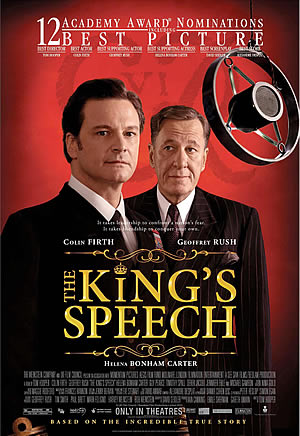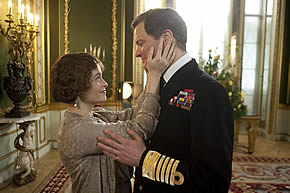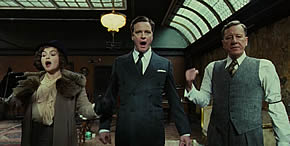THE KING'S SPEECH (2010)
Genre: Drama/History
Director: Tom Hooper
Cast: Colin Firth, Geoffrey Rush, Helena Bonham Carter, Jennifer Ehle, Guy Pearce, Derek Jacob, Timothy Spall, Michael Gambon, Claire Bloom, Eve Best, Anthony Andrews
RunTime: 1 hr 58 mins
Released By: Cathay-Keris Films
Rating: PG (Some Coarse Language)
Official Website: http://www.kingsspeech.com/
Opening Day: 10 February 2011
Synopsis: After the death of his father King George V (Michael Gambon) and the scandalous abdication of Prince Edward VII's (Guy Pearce), Bertie (Colin Firth) who has suffered from a debilitating speech impediment all his life, is suddenly crowned King George VI of England. With his country on the brink of war and in desperate need of a leader, his wife, Elizabeth (Helena Bonham Carter), the future Queen Mother, arranges for her husband to see an eccentric speech therapist, Lionel Logue (Geoffrey Rush). After a rough start, the two delve into an unorthodox course of treatment and eventually form an unbreakable bond. With the support of Logue, his family, his government and Winston Churchill (Timothy Spall), the King will overcome his stammer and deliver a radio-address that inspires his people and unites them in battle. Based on the true story of King George VI, THE KING'S SPEECH follows the Royal Monarch's quest to find his voice.
Movie Review:
With the big Oscar hype (12 Academy nominations, no less) surrounding it at the moment, The King’s Speech has found in its hands a big local audience expectation to fulfil. Fortunately, it does so with little stammer, largely and ironically thanks to Colin Firth’s Bertie. As if public speaking is not fearsome enough, the soon-to-be king has to overcome his speech impediment and the personal demons that led to it in order to speak to and for a few million British subjects.
The condition is portrayed with such heartbreaking anguish that it is quite impossible to not feel for the character. While the future King George VI or Bertie as known to his family, struggles through guttural sounds, open-mouthed silence and pained eyes, his own voice seems to literally choke rather than express him. Firth is also aided by shots and scenes that take time to magnify the frustration in his expression and project every vocal sound that he attempts to and successfully makes. One thing that the film is successful in is representing and relating to the audience the physical experience of a person who stammers not to invoke pity, but the compassion to root for the character.
And like all good dramas, it does not leave out character psyche. Enter Geoffrey Rush’s charming and warm character of speech therapist Lionel Logue and his unorthodox cures to help. As he searches for the mental root of the condition, layers are uncovered to reveal the man beneath the crown. Friendship between the two eventually blossoms, but not without the resistance of stifling subject-royalty protocols, the king’s own hopelessness for his lifelong condition and his anxiety towards ascending the throne. One particular moving scene sees the head of the British monarch breaking down in his wife’s arms because of his sudden kingship thanks to his elder brother’s free-spiritedness. As King Edward VII leaves the court to marry a twice-divorced American, one cannot help but feel slightly more informed about the sometimes tragic ways of royalty and notice that times have indeed changed. Prince Charles, anyone?
As not unexpected, The King’s Speech joins a handful line of films that attempt to reveal the private side of the public figure for the ever-curious common masses. It is indeed quite a treat to watch the Queen’s Mother as a supportive and loving wife and recognise other significant figures like William Churchill and Prince Harry’s granny as a young girl even if they are well, not really the real deal.
True to its historical genre, the wardrobe and setting are carefully created to give us a glimpse into the lives of rulers and royalty while at the same time evoking the mood of an era where change was happening as fast as the Second World War was approaching.
And as King George VI finally faces the wireless mic - the high-tech product of its time and symbol that appears regularly throughout the film, to boldly and fluently deliver his first wartime message for his people, one cannot help but wonder that underneath the simple heart-warming story of a man overcoming his odds, there might be a subtle social commentary on how much we, the internet/smartphone generation, have not really taken the time to appreciate the simple act of communication or use it for nobler purposes. And if so, I’m rooting for this one to win some Oscars.
Movie Rating:




(An inspiring story not about what a King says, but how he said it)
Reviewed by Siti Nursyafiqa

Movie Stills



